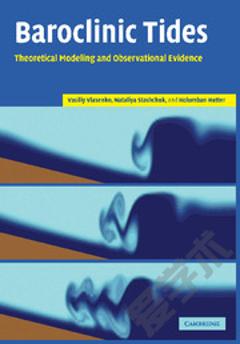Baroclinic Tides: Theoretical Modeling and Observational Evidence
This book was first published in 2005. When an oceanic tidal wave that is primarily active on the water surface passes an ocean shelf or a region with a seamount, it is split into a less energetic surface wave and other internal modes with different wavelengths and propagation speeds. This cascading process, from the barotropic tides to the baroclinic components, leads to the transformation of tidal energy into turbulence and heat, an important process for the dynamics of the lower ocean. Baroclinic Tides demonstrates the analytical and numerical methods used to study the generation and evolution of baroclinic tides and, by comparison with experiments and observational data, shows how to distinguish and interpret internal waves. Strongly non-linear solitary internal waves, which are generated by internal tidal waves at the final stage of their evolution, are investigated in detail. This book is intended for researchers and graduate students of physical oceanography, geophysical fluid dynamics and hydroacoustics.
{{comment.content}}








 京公网安备 11010802027623号
京公网安备 11010802027623号